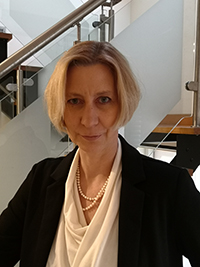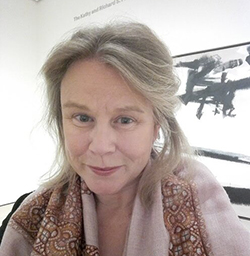Friday, 01 October 2021
What can photographs of the Holocaust teach us about how to view modern day images of the victims of war, persecution and refugees? That’s the central question discussed in a new free online course from the University of Nottingham.
Photographing the Holocaust is a three-week visual journey of discovery created by researchers in the Department of History and the UK’s National Holocaust Centre and Museum in Laxton, Nottinghamshire.
The Futurelearn course is a guided exploration of issues surrounding the photography that was carried out during the Holocaust and how it can throw new light on present day capturing of world events. Questions to be covered include – what insights do the photos offer into German National Socialism and the Holocaust, and are they authentic records or could some be misleading ‘fake news’?
 Professor of History, Maiken Umbach
Professor of History, Maiken Umbach
The course is open to anyone and has been created by Professor of Modern History, Maiken Umbach and the University’s Learning Technology team. Professor Umbach said:
“This new and easily accessible online learning resource is an ideal opportunity for anyone exploring the role of photography in recording and manipulating violent world events. In terms of the Holocaust we have relied too much on Nazi propaganda photos to imagine this darkest chapter of human history and this course will give people the opportunity to look at imagery created by the victims of Nazism to compare perspectives and decode visual bias.
“Using an extensive library of Holocaust photography, the course explores what happened to individuals persecuted by the Nazi regime. For example, we show how the photographs taken by these individuals compare with official Nazi visual culture, including which elements the Nazis rejected or ignored. The course will give people an in-depth understanding of the problems of propaganda photography and will better inform our attitudes to contemporary photography of victims and refugees reflected in today’s media and social media.”
 Claudia Linda Reese, National Holocaust Centre and Museum
Claudia Linda Reese, National Holocaust Centre and Museum
Co-lead educator on the course, Claudia Linda Reese from the National Holocaust Centre and Museum said: ““Photography forms a central part of our collection and makes a vital contribution to our mission to preserve the memory of the victims of the Holocaust. For audiences, this course is an opportunity to appreciate the depth of meaning the private photos hold that Holocaust survivors entrusted to us as a museum and memorial site. On the other hand, the study of perpetrator photography serves as a timely warning not to underestimate the persistent danger emanating from photography that is designed to manipulate the viewer and target difference.
“The National Holocaust Centre and Museum aspires to educate new generations to become critical thinkers, resistant to the danger of Anti-Jewish Hate and other forms of hatred that are pervasive throughout history. This course offers a deeper understanding of one aspect of the Holocaust and empowers participants to take positive action as consumers of images in the media today.”
Registration to the course is open now via this link and the course goes live on Monday 11th October 2021. The course involves 5 hours of study each week. Participants can follow the modules at their own pace and interact with other students online. The course leaders will be available to join the discussions and answer questions in the comments section until Friday 29th October.
The course follows a very successful touring exhibition of Holocaust photography which opened at South Hampstead Synagogue to mark the 75th anniversary last year. The Eye as Witness – Recording the Holocaust is at Lakeside on University Park in Nottingham from 22nd January until 13th March 2022. It will also be coming to the Jewish Museum in Albert Street, Hampstead, London in the New Year.
Story credits
For more information, please contact Professor Maiken Umbach, Department of History, University of Nottingham via email maiken.umbach@nottingham.ac.uk or Emma Rayner, Media Relations Manager on 07738 291242 or emma.rayner@nottingham.ac.uk
Notes to editors:
About the University of Nottingham
Ranked 97 in the world and 17th in the UK by the QS World University Rankings, the University of Nottingham is a founding member of Russell Group of research-intensive universities. Studying at the University of Nottingham is a life-changing experience, and we pride ourselves on unlocking the potential of our students. We have a pioneering spirit, expressed in the vision of our founder Sir Jesse Boot, which has seen us lead the way in establishing campuses in China and Malaysia - part of a globally connected network of education, research and industrial engagement.
Nottingham was crowned Sports University of the Year by The Times and Sunday Times Good University Guide 2024 – the third time it has been given the honour since 2018 – and by the Daily Mail University Guide 2024.
The university is among the best universities in the UK for the strength of our research, positioned seventh for research power in the UK according to REF 2021. The birthplace of discoveries such as MRI and ibuprofen, our innovations transform lives and tackle global problems such as sustainable food supplies, ending modern slavery, developing greener transport, and reducing reliance on fossil fuels.
The university is a major employer and industry partner - locally and globally - and our graduates are the third most targeted by the UK's top employers, according to The Graduate Market in 2024 report by High Fliers Research.
We lead the Universities for Nottingham initiative, in partnership with Nottingham Trent University, a pioneering collaboration between the city’s two world-class institutions to improve levels of prosperity, opportunity, sustainability, health and wellbeing for residents in the city and region we are proud to call home.
More news…